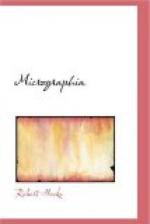The fabrick of the wing, as it appears through a moderately magnifying Microscope, seems to be a body consisting of two parts, as is visible in the 4. Figure of the 23. Scheme; and by the 2. Figure of the 26. Scheme; the one is a quilly or finny substance, consisting of several long, slender and variously bended quills or wires, something resembling the veins of leaves; these are, as ’twere, the finns or quills which stiffen the whole Area, and keep the other part distended, which is a very thin transparent skin or membrane variously folded, and platted, but not very regularly, and is besides exceeding thickly bestuck with innumerable small bristles, which are onely perceptible by the bigger magnifying Microscope, and not with that neither, but with a very convenient augmentation of sky-light projected on the Object with a burning Glass, as I have elsewhere shew’d, or by looking through it against the light.
In steed of these small hairs, in several other Flies, there are infinite of small Feathers, which cover both the under and upper sides of this thin film as in almost all the sorts of Butterflies and Moths: and those small parts are not onely shap’d very much like the feathers of Birds, but like those variegated with all the variety of curious bright and vivid colours imaginable; and those feathers are likewise so admirably and delicately rang’d, as to compose very fine flourishings and ornamental paintings, like Turkie and Persian Carpets, but of far more surpassing beauty, as is evident enough to the naked eye, in the painted wings of Butterflies, but much more through an ordinary Microscope.
Intermingled likewise with these hairs, may be perceived multitudes of little pits, or black spots, in the exended membrane, which seem to be the root of the hairs that grow on the other side; these two bodies seem dispers’d over the whole surface of the wing.
The hairs are best perceiv’d, by looking through it against the light, or, by laying the wing upon a very white piece of Paper, in a convenient light, for thereby every little hair most manifestly appears; a Specimen of which you may observe drawn in the fourth Figure of the 23. Scheme, AB, CD, EF whereof represent some parts of the bones or quills of the wing, each of which you may perceive to be cover’d over with a multitude of scales, or bristles, the former AB, is the biggest stem of all the wing, and may be properly enough call’d




